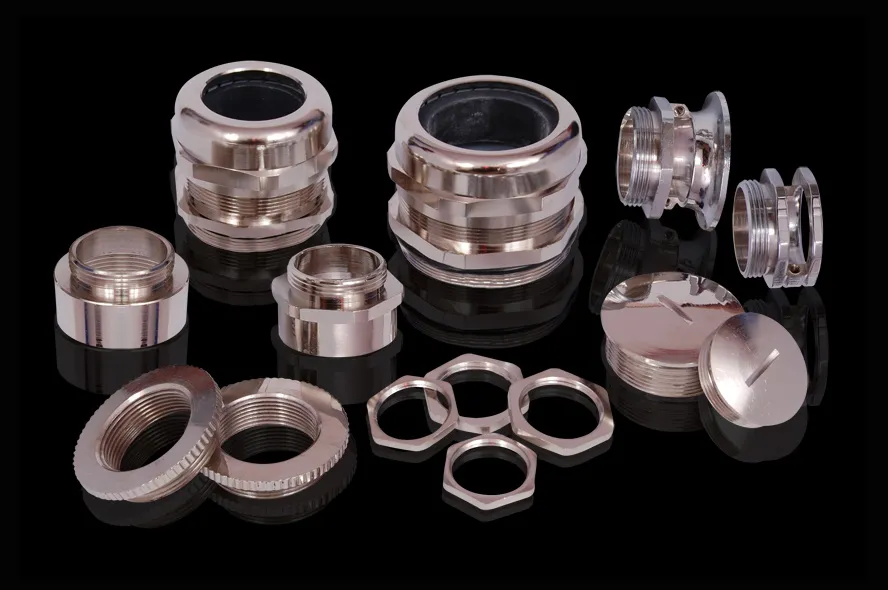Brass Electrical Fittings have become an integral part of modern electrical systems, offering a reliable and durable solution for various applications. This article explores the ins and outs of brass electrical fittings, from their unique properties to installation tips and customer testimonials.
What Makes Brass Ideal?
Brass, a metal alloy composed of copper and zinc, boasts exceptional properties that make it an ideal material for electrical fittings. Its conductivity, durability, and resistance to corrosion set it apart in the world of electrical components.
Types of Brass Electrical Fittings
Brass electrical fittings come in a diverse array of types, each serving a specific purpose in electrical applications. Understanding the various fittings available is crucial for making informed choices in installations. Let’s explore the key types of brass electrical fittings:
1. Connectors and Terminals
Connectors and terminals made from brass are fundamental components in electrical systems. They facilitate secure connections between wires and devices, ensuring efficient conductivity and minimal electrical resistance.
2. Switches and Sockets
Brass switches and sockets combine functionality with aesthetics. These fittings are not only reliable in controlling electrical circuits but also add a touch of elegance to residential and commercial spaces.
3. Specialized Fittings
Beyond the basics, brass finds its way into specialized electrical fittings designed for specific applications. These may include junction boxes, couplings, and grounding fittings, providing tailored solutions for diverse electrical needs.
4. Conduit Fittings
Brass conduit fittings play a crucial role in protecting electrical wiring from physical damage and environmental factors. These fittings ensure the integrity of the wiring system, enhancing safety and longevity.
5. Grounding Clamps
Grounding is a critical aspect of electrical systems to prevent electrical shocks and ensure safety. Brass grounding clamps offer a reliable connection to ground wires, maintaining a secure and effective grounding system.
6. Cable Glands
In industrial settings where cables need protection and secure entry points, brass cable glands come into play. These fittings provide a watertight seal, preventing the ingress of dust and moisture, thus safeguarding the integrity of the cables.
7. Adapters and Reducers
Brass adapters and reducers serve as connectors between different types and sizes of electrical components. They enable seamless transitions, ensuring compatibility and flexibility in electrical installations.
8. Busbars
For efficient distribution of electrical power within panels and switchboards, brass busbars are utilized. These conductive bars provide a reliable and low-resistance pathway for electrical currents.
9. Fuses and Holders
Incorporating brass in fuse holders enhances their durability and conductivity. Brass fittings in this category ensure the safe and efficient functioning of fuses, protecting electrical systems from overloads.
10. Terminals Blocks
Brass terminal blocks act as junction points for connecting multiple wires or cables. Their design allows for organized and secure connections, simplifying the management of complex wiring systems.
11. Plugs and Receptacles
Brass plugs and receptacles serve as interfaces for connecting electrical devices to power sources. These fittings are designed for durability and reliability, ensuring a stable electrical connection.
12. Panelboard Fittings
Panelboards are central to electrical distribution, and brass fittings in this category contribute to the efficiency and longevity of these systems. They include lugs, nuts, and bolts designed for secure connections.
13. Pipe Fittings
In certain electrical applications, especially those involving conduits or enclosures, brass pipe fittings are used for secure and leak-proof connections. These fittings contribute to the overall robustness of the electrical infrastructure.
14. Grommets and Bushings
Brass grommets and bushings provide protective covering for wires passing through panels or enclosures. These fittings prevent abrasion and damage to wires, ensuring the safety and reliability of the electrical system.
15. Locknuts and Washers
Locknuts and washers made from brass play a crucial role in securing fittings in place. They enhance the stability of electrical components, preventing loosening and maintaining the integrity of the installation.
In conclusion, the versatility of brass extends to a wide range of electrical fittings, each serving a specific purpose in ensuring the efficiency, safety, and longevity of electrical systems.

Advantages of Brass Electrical Fittings
The advantages of opting for brass electrical fittings are manifold. Not only do they resist corrosion, ensuring a longer lifespan, but they also bring an aesthetic appeal to electrical installations.
Applications in Various Industries
The use of brass electrical fittings extends across industries, including construction, electronics, and automotive. Their reliability and performance make them a preferred choice in diverse settings.
Installation and Maintenance Tips
Proper installation is crucial for the effective performance of brass electrical fittings. This section provides valuable tips for installation procedures and maintenance practices to ensure their longevity.
Comparison with Other Materials
A comparative analysis with other materials like copper and aluminum sheds light on why brass stands out. Factors such as conductivity, durability, and cost-effectiveness are explored.
Cost Considerations
While brass may be perceived as a premium material, its long-term benefits often outweigh the initial costs. This section delves into the affordability and value for money aspects of choosing brass electrical fittings.
Environmental Impact
Sustainability is a key consideration in the modern world. Brass emerges as a sustainable option, and its recycling possibilities contribute to reducing environmental impact.
Quality Standards and Certifications
Compliance with industry standards and certifications ensures the reliability and safety of brass electrical fittings. This section emphasizes the importance of adhering to quality benchmarks.
Innovations in Brass Electrical Fittings
As technology advances, so do brass electrical fittings. Explore the latest innovations and future trends in this dynamic field, showcasing the role of brass in cutting-edge electrical applications.
Customer Testimonials
Real-life experiences from users highlight the positive aspects of using brass electrical fittings. These testimonials provide insights into the satisfaction and reliability of brass components.
Common Myths About Brass Electrical Fittings
Dispelling myths and addressing misconceptions, this section aims to provide clarity on any doubts or concerns surrounding the use of brass electrical fittings.
DIY Brass Electrical Fitting Projects
For enthusiasts keen on DIY projects, this section offers simple yet effective ideas using brass fittings. Additionally, safety precautions are outlined to ensure a secure DIY experience.
Conclusion
In conclusion, the world of electrical fittings is evolving, and brass plays a pivotal role in this transformation. Its unique properties, coupled with advancements in technology, make brass electrical fittings a reliable and future-ready choice for diverse applications.
Frequently Asked Questions (FAQs)
- Q: Are brass electrical fittings more expensive than other materials?
A: While brass may have a higher initial cost, its long-term benefits often outweigh the upfront expenses, making it a cost-effective choice. - Q: Can brass electrical fittings be recycled?
A: Yes, brass is a recyclable material, contributing to sustainability efforts and reducing environmental impact. - Q: Are there specific safety measures for DIY brass electrical fitting projects?
A: Absolutely. Prioritize safety by using proper tools, following guidelines, and ensuring all installations adhere to electrical safety standards. - Q: How does brass compare to copper in electrical applications?
A: Both brass and copper are excellent conductors, but brass offers additional benefits such as corrosion resistance and an attractive appearance. - Q: Are there any industry standards for brass electrical fittings?
A: Yes, adherence to quality standards and certifications is crucial to ensuring the reliability and safety of brass electrical fittings.



